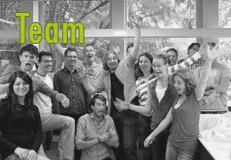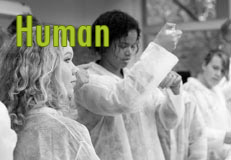Team:Groningen/Home
From 2010.igem.org
(Difference between revisions)
Joelkuiper (Talk | contribs) (→Self assembling hydrophobic biofilm) |
Joelkuiper (Talk | contribs) (→Self assembling hydrophobic biofilm) |
||
| Line 37: | Line 37: | ||
} | } | ||
#home-boxes div div { | #home-boxes div div { | ||
| - | margin: | + | border: none!important; |
| + | margin: 1em; | ||
} | } | ||
#home-boxes img { | #home-boxes img { | ||
Revision as of 19:40, 26 October 2010



Self assembling hydrophobic biofilm
Surface hydrophobicity is a very useful property and is used in many applications ranging from raincoats, antifouling coatings to applications in the field of medical sciences.
The idea is to engineer a bacterium that once applied to a surface starts forming a fast growing rigid biofilm. The formation will trigger the expression of hydrophobic proteins called chaplins. These hydrophobic proteins will be incorporated in the biofilm, causing strong hydrophobic surface activity. The result is a hydrophobic bio-based surface coating.

Team.
This year a team of young inspired undergraduates from the [http://www.rug.nl University of Groningen] participated in the amazing challenge of iGEM. A multi-disciplinary team of Molecular Biologists, Chemists, Computer Scientists, Journalists and others spend the summer creating a wonderful project in the emerging field of synthetic biology

Model.
Using computer models we worked on the frontiers of knowledge. Gene expression was simulated and a simple explanation for cell differentiation was proposed. Also aiding in ethics and practical feasibility a kill switch system was studied. Finally a new standard was proposed for characterizing Biobrick parts so future can be streamlined.
Our sponsors
 "
"









